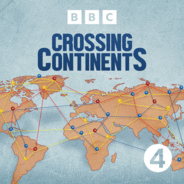No fewer than 15 football club bosses have been murdered in Bulgaria's top football league in the last decade alone. In this edition of Crossing Continents Margot Dunne investigates reports that many have been deeply involved in mafia businesses.There are continuing reports that the game is riddled with corrupt practices including match-fixing and the illegal procurement of European Union passports for overseas players.Crossing Continents examines these claims, attending a match which has allegedly been fixed in advance and speaks to a player who says he was offered money to throw a match.The programme also meets Todor Batkov, chairman of one of the country's best known football clubs, Levski Sofia, who accepts that corruption in the national game is as deep rooted as ever.Producer: Ed Butler.

Kultur & Gesellschaft
Crossing Continents Folgen
Stories from around the world and the people at the heart of them.
Folgen von Crossing Continents
405 Folgen
-
Folge vom 23.08.2012Bulgaria's Criminal Football
-
Folge vom 16.08.2012Korea Host BarsSouth Korean women, tradition says, are hard-working, respectful to family, and know their place in Korea's Confucian hierarchies. But the country's rapid economic development has meant some startling changes below the surface of that conservative social structure. Perhaps the most controversial is the advent of Host Bars - all night drinking rooms where female customers can select and pay for male companions, sometimes at a cost of thousands of dollars a night. Originally set up to cater to off-duty 'hostesses' and female escorts, they're now proving popular with many other women too. The growth of the industry is throwing up new questions for South Korea's sociologists and politicians as they struggle to reconcile the country's traditional values with the effects of its rapid development. The BBC's Seoul correspondent Lucy Williamson reports.
-
Folge vom 09.08.2012Cold Turkey in KarachiKarachi is facing a drugs epidemic. Pakistan's sprawling port city has an estimated half a million chronic heroin addicts. The drug is cheap and easily available as it comes across the Pakistan/Afghanistan border, before being shipped to Europe and the US. Mobeen Azhar finds out how a charity is trying to help addicts and their families.An NGO called the Edhi Foundation operates what is thought to be the world's largest drug rehabilitation centre. It's here that Mobeen meets brothers Yusaf and Husein who have checked themselves in. Patients who volunteer for treatment like this can leave whenever they feel ready. But the majority of patients, like 24-year-old Saqandar, are brought in by their desperate relatives, and according to Edhi rules, only the family can decide when they will be released.The centre offers heroin users food and painkillers to ease the physical symptoms of withdrawal - but conventional treatment like methadone is not available. So does enforced cold turkey really work?Mobeen follows the stories of three heroin addicts and finds out how the stress of their addiction takes its toll on them and their families.Presenter: Mobeen Azhar Producer: Ben Crighton.
-
Folge vom 02.08.2012Rwanda CyclingRwanda is a nation of bicycles; large cumbersome machines, piled high with sacks of coffee or potatoes, so heavy they can only be pushed up the steep winding roads in this "land of a thousand hills." Rwanda -- a country known only for the genocide of 1994, when an estimated 800,000 people, mainly ethnic Tutsis, were murdered in cold blood in a mere 100 days -- is also a nation in need of heroes. It may now have found them: lycra-clad athletes in helmets and wrap-around sunglasses on five thousand dollar racing bikes. They are Team Rwanda, the national cycling team, its tightly packed and brightly coloured peloton now a familiar sight on their training rides on the roads around Ruhengeri in the country's north-west, not far from the border with Uganda. For this week's Crossing Continents Tim Mansel has spent a week with Team Rwanda as they prepare for their latest international competition, the Tour of Eritrea. The team assembles on a Monday night from all over Rwanda. They come by bike, some after riding for three or four hours, one after a ride of six. Their week is a series of gruelling rides, nutritious food, and daily yoga, all under the critical eye of their outspoken American coach, Jock Boyer.It's impossible to spend time in Rwanda without being confronted by the genocide. A large purple banner adorns the main street in Ruhengeri, its message unmissable - Jenocide, it proclaims - and this year's slogan: "Learning from History to build a bright future." And only a few hundred yards from where the riders live is the town's genocide memorial, a walled garden dominated by a disturbing monument - the figure of a man pleading for his life and a machete that appears to be dripping in blood. Team Rwanda is not immune from the genocide, indeed it makes explicit connections. Its website features biographies of several of its riders: Rafiki Uwimana, a small child in 1994, sent by his parents to live in the countryside to escape the horrors of the capital Kigali, forced to hide in the forest from the Hutu militias, and almost dying of malaria before being saved by the Tutsi RPF militia invading from Uganda; or Obed Rugovera, who lost three siblings and two uncles in the carnage."The genocide has affected every one of the riders profoundly and you can feel it even without talking about it," says the coach, Jock Boyer. "Cycling...gives them the hope that they can buy a house, provide for their family, do something they're good at and that they're recognised for and that the country is not just going to be known for a genocide.".
